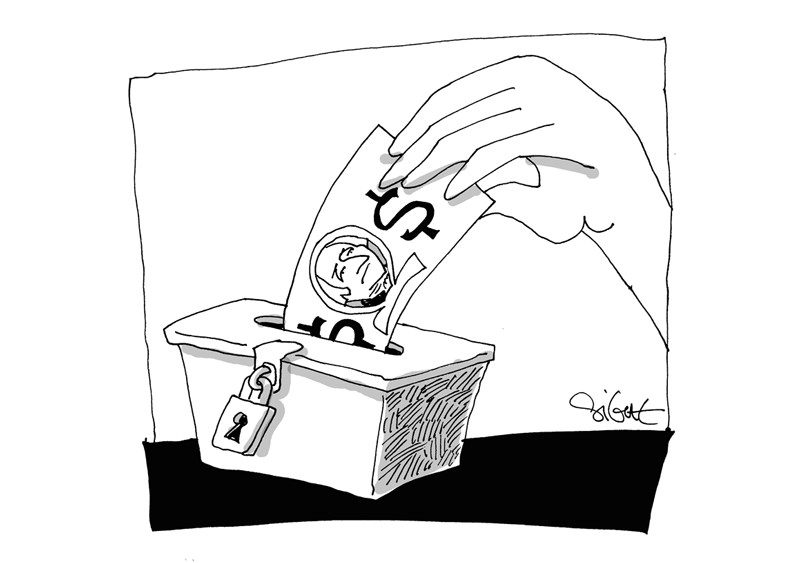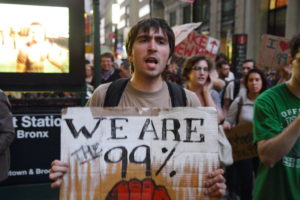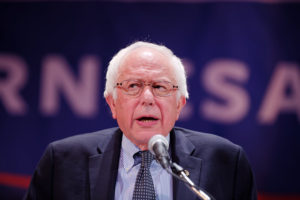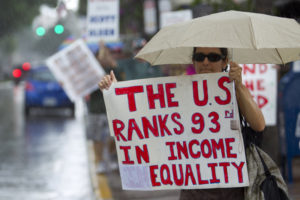McCutcheon and the Vicious Cycle of Concentrated Wealth and Political Power
If wealth and income weren’t already so concentrated in the hands of a few, the shameful McCutcheon decision by the five Republican appointees to the Supreme Court wouldn’t be as dangerous. A cartoon by Signe Wilkinson titled "Ballot Box." Signe Wilkinson
A cartoon by Signe Wilkinson titled "Ballot Box." Signe Wilkinson
This post originally ran on Robert Reich’s Web page.
If wealth and income weren’t already so concentrated in the hands of a few, the shameful “McCutcheon” decision by the five Republican appointees to the Supreme Court wouldn’t be as dangerous. But by taking “Citizen’s United” one step further and effectively eviscerating campaign finance laws, the Court has issued an invitation to oligarchy.
Almost limitless political donations coupled with America’s dramatically widening inequality create a vicious cycle in which the wealthy buy votes that lower their taxes, give them bailouts and subsidies, and deregulate their businesses – thereby making them even wealthier and capable of buying even more votes. Corruption breeds more corruption.
That the richest four hundred Americans now have more wealth than the poorest 150 million Americans put together, the wealthiest 1 percent own over 35 percent of the nation’s private assets, and 95 percent of all the economic gains since the start of the recovery in 2009 have gone to the top 1 percent — all of this is cause for worry, and not just because it means the middle class lacks the purchasing power necessary to get the economy out of first gear. It is also worrisome because such great concentrations of wealth so readily compound themselves through politics, rigging the game in their favor and against everyone else. “McCutcheon” merely accelerates this vicious cycle.
As Thomas Piketty shows in his monumental “Capital in the Twenty-First Century,” this was the pattern in advanced economies through much of the 17th, 18th, and 19th centuries. And it is coming to be the pattern once again.
Picketty is pessimistic that much can be done to reverse it (his sweeping economic data suggest that slow growth will almost automatically concentrate great wealth in a relatively few hands). But he disregards the political upheavals and reforms that such wealth concentrations often inspire — such as America’s populist revolts of the 1890s followed by the progressive era, or the German socialist movement in the 1870s followed by Otto von Bismarck’s creation of the first welfare state.
In America of the late nineteenth century, the lackeys of robber barons literally deposited sacks of money on the desks of pliant legislators, prompting the great jurist Louis Brandeis to note that the nation had a choice: “We can have a democracy or we can have great wealth in the hands of a few,” he said. “But we cannot have both.”
Soon thereafter America made the choice. Public outrage gave birth to the nation’s first campaign finance laws, along with the first progressive income tax. The trusts were broken up and regulations imposed to bar impure food and drugs. Several states enacted America’s first labor protections, including the 40-hour workweek.
The question is when do we reach another tipping point, and what happens then?
Your support matters…Independent journalism is under threat and overshadowed by heavily funded mainstream media.
You can help level the playing field. Become a member.
Your tax-deductible contribution keeps us digging beneath the headlines to give you thought-provoking, investigative reporting and analysis that unearths what's really happening- without compromise.
Give today to support our courageous, independent journalists.









You need to be a supporter to comment.
There are currently no responses to this article.
Be the first to respond.